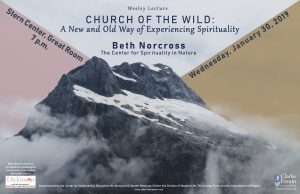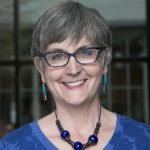 The Center for Spirituality in Nature
The Center for Spirituality in Nature
Wesley Lecture
Church of the Wild: A New and Old Way of Experiencing Spirituality
Wednesday, January 30, 2019
Stern Center, Great Room, 7 p.m.
Norcross will share information about her organization’s new Church of the Wild, that gathers people in nature to celebrate the mutual indwelling of the Divine and the earth. She will discuss how the gathering is attracting both regular church-goers as well as those for whom traditional church is not appealing.
This lecture is sponsored by the Clarke Forum for Contemporary Issues and the Center for Service, Spirituality and Social Justice with special thanks to the Baltimore-Washington Conference of the United Methodist Church and co-sponsored by Division of Student Life; the College Farm; the Center for Sustainability Education; the Women’s & Gender Resource Center; and the departments of religion and environmental studies. It is part of the Clarke Forum’s semester theme, Sustainability.
Biography (provided by the speaker)
 Founder and executive director Beth Norcross brings her training and experience in both theology and ecology in founding and leading the Center for Spirituality in Nature. An enthusiastic and popular teacher, speaker and preacher, she loves to share her passion and affection for both the earth and the Spirit with others.
Founder and executive director Beth Norcross brings her training and experience in both theology and ecology in founding and leading the Center for Spirituality in Nature. An enthusiastic and popular teacher, speaker and preacher, she loves to share her passion and affection for both the earth and the Spirit with others.
Norcross is adjunct faculty at Wesley Theological Seminary in Washington, D.C., where she has developed and taught courses on eco-spirituality and eco-theology. She has spoken to a wide variety of churches, written several articles and developed educational resources for congregations, including a spiritual study guide to Ken Burns’ film, The National Parks: America’s Best Idea.
Along with colleagues Laurel Kearns and David Rhoads, Beth co-founded the Green Seminary Initiative dedicated to infusing care for the earth into theological education. She also recently served as the Steering Committee chair of the Greater Washington Interfaith Power and Light, a Washington, D.C.-based group that, as part of the national Regeneration Project, encourages congregations to limit their carbon footprints by reducing energy use.
The Wesley Lecture
The Wesley Lecture grows out of the historical relationship between Dickinson College and the Methodist Church, a relationship that has its roots in the 19th century. The lecture highlights contemporary conversations and controversies in faith communities and in higher education about the importance and role of community, commitment, and service for the education of the citizen-scholar.
Video of the Lecture
